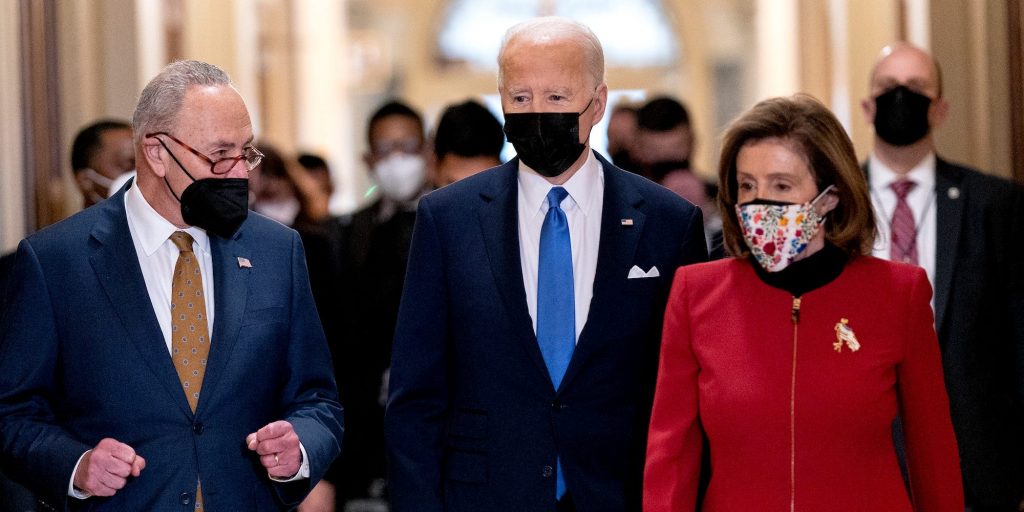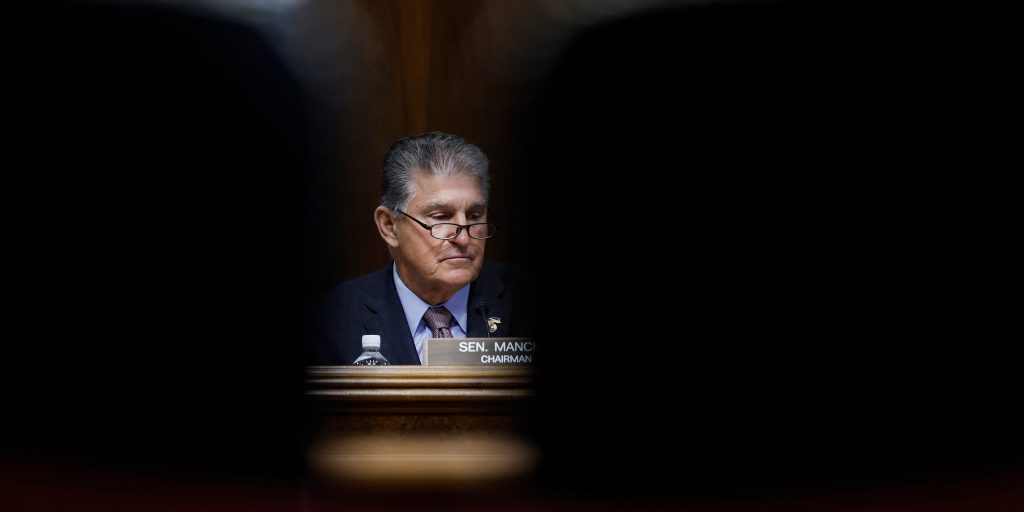- Democrats seem wary of going on a wild-goose chase to win over Manchin on climate.
- The year-long negotiating chaos has yielded a skinny bill centered on healthcare.
- Manchin has not made his vote an easy thing to lock down for his party.
Senate Majority Leader Chuck Schumer is advancing the skinny, healthcare package that Sen. Joe Manchin of West Virginia offered as a concession. But the Democratic lawmakers asking themselves "Is this it?" still aren't ready to throw in the towel on a climate deal with Manchin.
Several Senate Democrats such as Sen. Ed Markey of Massachusetts are pressing for a Hail Mary shot to secure the support of Manchin on another spending package after September. Beginning with the new federal fiscal year in October, Democrats can craft another reconciliation bill separate from the one they aim to pass within weeks, also capable of skirting fierce GOP opposition and passing with only a simple majority vote. Democrats floated the maneuver last fall when final passage appeared achievable by the end of 2021.
But other Democrats seem incredulous at the prospect of getting anything on climate approved after the year-long, wild goose-chase Manchin led them on. In the end, all the procedural mayhem is poised to yield a healthcare bill that's a huge step down from their initial $3.5 trillion blueprint to reconfigure the American economy.
"Do you think it's possible?" Sen. Jon Tester of Montana responded to Insider with a puzzled look when asked about the chance of a second Democrat-only spending plan for climate.
"What's changed with this reconciliation bill or the next reconciliation bill?" Tester said with a laugh. "I think focus on this one, get this one done, get some healthcare and prescription drugs, then move on."
Democratic aides granted anonymity to speak candidly also largely expressed skepticism. One described it as "a pipe dream."
Such an endeavor rests on Manchin, the swerving conservative Democrat who hasn't made things easy for his party. He stunned many last week by yanking support for climate programs and tax hikes that he had backed for months, citing worsening inflation. Manchin offered to keep negotiating on climate or lend his vote for a healthcare bill centered on extending Obamacare financial aid and reining in the cost of prescription drugs. Democrats are pursuing the latter to secure a win and deliver on campaign promises years in the making.
Insider approached Manchin on Thursday to ask about a potential second reconciliation bill that deals with climate programs. He waved the question off and declined to comment.
Plenty of Democrats, however, say they want to keep the option open and warn that failure would jeopardize the planet's future. "With respect to the second reconciliation, it sounds like a big lift to me but I'm open to everybody's ideas," Sen. Ron Wyden, chair of the tax-writing Senate Finance Committee, said in an interview. "The consequences of inaction are so great."
Without a deal to secure programs to transition the nation to cleaner energy sources, the US is likely to miss Biden's goal of slashing emissions in half by 2030. The target is meant to restrain global warming at 1.5 degrees Celsius, the threshold in which severe storms, droughts, and floods become far more likely. The planet has warmed 1.1 degrees Celsius already.
"I think all options ought to be on the table," Sen. Mark Warner of Virginia told Insider. "And the idea when we've seen country after country in Europe with record high heats and most of the center-part of America with temperatures in excess of 100 degrees. I mean some of these places are going to become uninhabitable."
It would be 'an uphill effort' to pursue a Manchin climate deal

The arc of the legislative universe is long, but it bends towards chaos on Build Back Better. It's that type of turmoil most Democrats are eager to put behind them as the midterm elections draw nearer.
"It seems very unlikely to get done before the November election," Zach Moller, the economic director of the center-left Third Way think tank, told Insider. "It's whether or not there is a path and desire to do it in the in the lame-duck Congress," referring to the period lasting from November through December between the midterm election and the swearing in of a new Congress in early January.
"It would be an uphill effort, for sure," John LaBombard, a former Democratic aide to Sen. Kyrsten Sinema, said in an interview. "It would be a mistake, always, to assume that 50 members of the same party are uniform in their thinking on these issues. We have now been reminded in very clear ways over the past 18 months that that is not the case."
Liam Donovan, a Republican strategist, argues that the hurdles facing Democrats may keep mounting.
"Whatever political problems you solve by getting past the election, guess what? There's another one coming," Donovan, who is also a lobbyist, told Insider. He said 23 Democratic senators are up for re-election in 2024 with Manchin among them. He argued some could balk at tax increases, particularly if the US economy starts to show signs of a slowdown.
The legislative to-do list is bound to get more packed after the midterms as well. Congress will likely need to deal with an omnibus package to fund the federal government for another year, plus haggle over a range of expiring tax programs. The frenzied pace of activity doesn't make conditions ripe for a sprawling deal with someone who tends to switch up his economic demands.
"One of the real problems here is that Senator Manchin was not an honest broker," Jim Manley, a former senior Democratic aide, told Insider. "He couldn't legislate his way out of a paper bag and felt absolutely no loyalty to the president and or this party."
Dit artikel is oorspronkelijk verschenen op z24.nl

